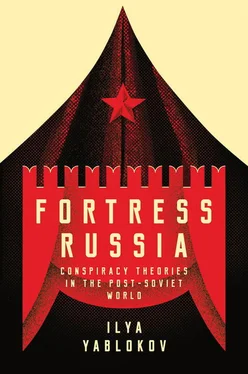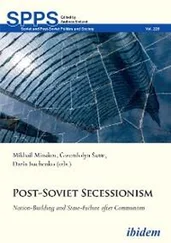The idea of ‘subversive agents’ intent on destroying the Soviet Union is one of the most popular conspiratorial notions. The search for a scapegoat in the form of a ‘foreign agent’ draws on a large body of publications and stories concerning treason against Russia. This concern about ‘foreign agents’ can be traced back to fear of German subversion before and during the First World War, the show trials accompanying the Great Purge in the 1930s, and a veritable spy mania on the part of the elites in the Soviet era. The concept of a ‘subversive agency’ can be a convenient and powerful tool. Authors of conspiracy theories merge real historical facts with imagined stories of treason, thus bringing into doubt former and current politicians’ loyalty to the state and, by doing so, undermining their reputations.
‘Westernized’ Intelligentsia Against Motherland
While Panarin and Kriuchkov are concerned with ‘agents of influence’, Sergei Kurginian, political consultant and former theatre director, has focused on the social factors relating to the Soviet collapse. Yet, it is rumoured that Kurginian was a political consultant to the leaders of GKChP , trying to arrange lucrative business under the government’s protection and later, in the 2010s, advised the controversial Moscow mayor Iurii Luzhkov, known for the corruption of the Moscow property market (Minkin, 2012; Belkovskii, 2016).
Kurginian blames the liberal intelligentsia and pro-Western political elites for selling the interests of the country in 1991 and ruining its historical mission. He uses the term anti-elite to describe what he sees as a union of the pro-Western political elites with the Russian liberal intelligentsia, who, together, corrupted Soviet politics during perestroika and ‘robbed’ the Soviet Union of its greatness (Chernykh, 2011). This anti-elite consisted of top-ranking figures in the Communist Party and the KGB. They initiated the August coup to cover up their destructive policies. Kurginian explains the dramatic decline in Russians’ standard of living as the result of pro-Western intellectuals making alliances with ‘shadowy business’, whose representatives eventually destabilized the Communist Party and became oligarchs, while the intelligentsia had to survive as best it could (Legostaev, 2002). The American ‘plan’ for Soviet destruction included producing a corpus of anti-Soviet historical research which corrupted Soviet ideology and demonstrated the supremacy of Western capitalism. During perestroika, as Kurginian (n.d.) argues, Russians were told that they should not dream about the glorious Communist future; ‘only the interests of the individual were important’.
Kurginian’s rhetoric about treacherous, pro-Western elites was interlaced with references to the socio-economic and ideological problems which emerged with the collapse of the Soviet state. His populist appeal, which involved laying the blame on the ‘anti-elite’ for the destruction of the state, was targeted primarily at educated Russians, the so-called intelligentsia, who suffered enormously under the economic reforms of the 1990s. Exploiting the grievances of this group, Kurginian further boosted his popularity by becoming a frequent guest on television talk shows. By the end of the 2000s he was hosting his own show, Istoricheskii protsess ( The Historical Process ), on the state-owned television channel Rossiia; this was dedicated to the discussion of various historical topics closely connected with contemporary political issues. Being the host of a television show provided him with an effective vehicle for disseminating conspiratorial ideas about the Soviet collapse. His popularity, in turn, helped him to gain a position in Putin’s presidential campaign of 2012 (discussed in Chapter 6); this clearly indicates the close ties he has with the Kremlin.
The Manipulation of Consciousness
The Russian chemist and writer Sergei Kara-Murza has presented another conspiratorial conceptualization of the Soviet collapse. This is based on the idea that a small group of people in the Soviet Union, with ‘external’ partners, and by means of manipulation, convinced the entire Soviet nation to destroy the country and abandon its ambitions to build Communism: ‘A certain influential and organized part of humankind (into which some of our compatriots have been accepted)… has convinced our society to act according to a programme which has brought enormous benefits to this group at enormous cost to ourselves’ (Kara-Murza, n.d.). He sees the consciousness of the Soviet people as a combination of ‘rationality (mind) and common ethics (heart)’ which allows them to grasp the world in its complexity, unlike the ‘technocratic Europeans’ who only have a restricted view of the world. He explains that a positive perception of the West first became popular among so-called anti-Soviet intellectuals; they distorted the meaning of Soviet symbols and institutions such as the Motherland, the State and the Army, all of which were crucial for the nation (Kara-Murza, 2009).
Kara-Murza’s writings have a strong focus on manipulation of public persuasion. This accords with an idea which was particularly popular in Russia at the beginning of the new millennium, that ‘social programming’ could replace genuine public engagement in politics (Gusev et al., 2006). This idea is linked to the successful deployment of the crude propaganda campaign which took place during the presidential elections in 1996, when within six months Yeltsin had gone from being at the bottom of the list of candidates to winning the election (Shevtsova, 1999, p. 156).
Kara-Murza’s focus on the use of manipulative technologies, and the relative popularity of this explanatory framework during the 2000s, can be compared to the American conspiracy theories devoted to brainwashing technologies which emerged during the Cold War. As Melley (2008, pp. 149, 162–4) suggests, conspiracy narratives about brainwashing are an attempt to theorize social and ideological influences on American society. For instance, the changing role of women and other progressive social changes in the 1960s were regarded by some American conspiracy theorists to be the result of Communist brainwashing tactics which endangered the ultimate virtue of American culture, individualism. According to this view, brainwashing corrupted liberal individualism, turning rational agents into brainwashed subjects under the control of an external, Communist mastermind.
The Russian version of the brainwashing theory echoes American fears of a less autonomous society, but places more concern on the possibility of a ‘thinking nation’ being replaced by a mob (Kara-Murza uses the term ‘mob-creation’, or tolpoobrazovanie ). According to Kara-Murza, the populations of West European countries, under the influence of television and popular culture, have been ‘transformed into a huge virtual mob always ready to sanction the policies of the leaders’ (Kara-Murza, n.d.).
In addition, Kara-Murza echoes American fears about threatened individuality. He states that ‘Western manipulators’ pose a threat to the ‘traditional Russian idea of the common cause’ that has always bonded individuals to society and thus strengthened the state. ‘Western society’ lacks ‘the core of ethical values’ which characterize Russia because of the unprecedented atomization of Western society which stems from the fact that it values individual rights and private ethics above all else (Kara-Murza, 2011, p. 170).
We can see from this that proponents of the brainwashing conspiratorial concepts in both the USA and post-Soviet Russia had a similar anxiety about social influences. The changing nature of Russian society, its transition to a market economy and the increasing value placed on individual rights evoke fears of an ‘evil-minded manipulation’ carried out by the West to destroy the ‘uniqueness’ of Russian society. According to this interpretation, the ease of the Soviet collapse in 1991 resulted from the persistent brainwashing of the Soviet people by Mikhail Gorbachev and the political elites loyal to him (Kara-Murza, 2002).
Читать дальше
Конец ознакомительного отрывка
Купить книгу












